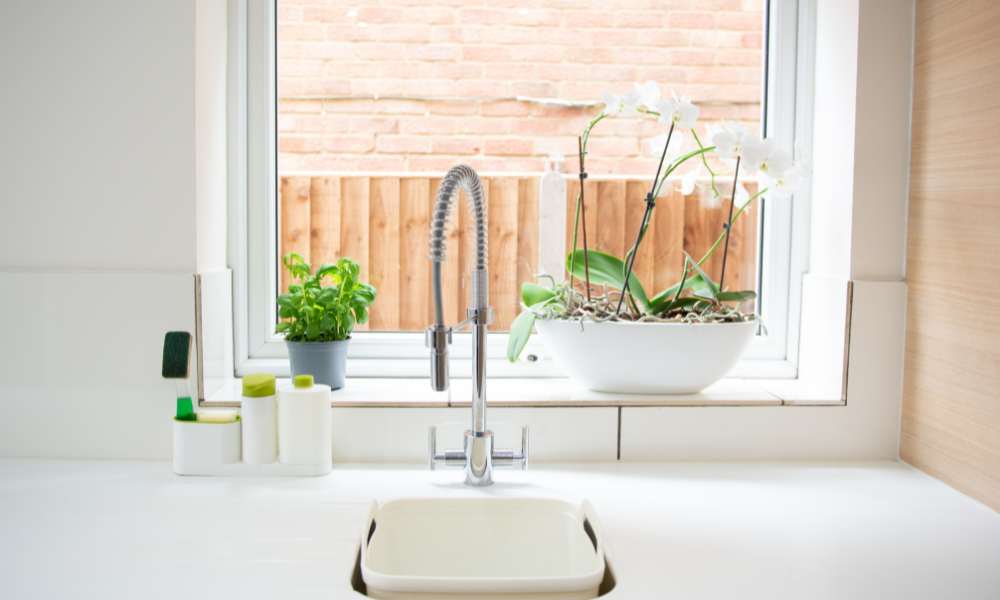Farmhouse sink clean, with their charming and rustic appeal, are a favorite in modern kitchens. However, keeping them clean and pristine requires a bit of know-how. Whether your farmhouse sink is made of porcelain, stainless steel, or copper, maintaining its beauty and functionality is essential. This guide will provide you with practical tips and step-by-step instructions to ensure your sink remains spotless and free from stains. From daily cleaning routines to tackling stubborn buildup and stains, you’ll learn how to care for your sink effectively. Read on to discover the best methods for keeping your farmhouse sink gleaming and ready for all your kitchen adventures.
Gather Your Cleaning Supplies

Before you start, make sure you have the following items on hand:
- Mild dish soap
- Baking soda
- White vinegar
- Soft sponge or cloth
- Soft-bristled brush
- Microfiber towel
- Lemon or essential oil (optional)
- Olive oil or mineral oil (for stainless steel sinks)
Daily Cleaning Routine
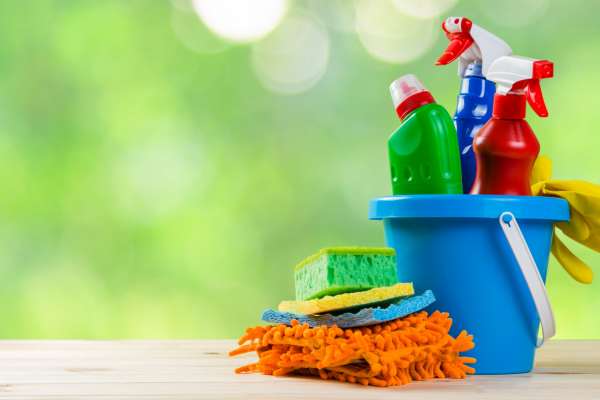
To keep your farmhouse sink looking its best, it’s crucial to perform daily cleaning. This will prevent buildup and make deeper cleaning sessions easier.
Rinse Thoroughly
After each use, rinse the sink with warm water to remove food particles and soap residue. This simple step prevents buildup and keeps your farmhouse sink looking fresh and clean. Regular rinsing ensures that any leftover debris doesn’t harden or stain the sink’s surface, making it easier to maintain in the long run.
Mild Soap and Water
Use a soft sponge and mild dish soap to scrub the sink. This gentle approach effectively removes daily grime without damaging the sink’s finish. Avoid using harsh chemicals or abrasive sponges, as these can scratch or dull the surface, compromising the sink’s aesthetic and durability. Regularly cleaning with mild soap and water ensures your farmhouse sink remains both beautiful and functional.
Rinse Again
Thoroughly rinse the sink to remove any soap residue. This step is crucial to prevent soap buildup, which can cause dull spots and attract dirt. Ensure that all areas of the sink are well-rinsed, leaving it clean and ready for the next use. Regular rinsing helps maintain the sink’s shine and prolong its life.
Deep Cleaning for Stains and Buildup
Even with daily maintenance, farmhouse sink clean can develop stains and buildup over time. Here’s how to tackle them:
For Porcelain or Fireclay Sinks
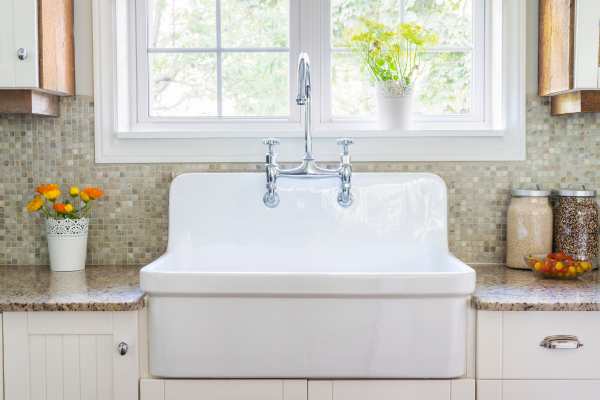
Create a Paste
Mix baking soda with a small amount of water to create a paste. This natural cleaning solution is effective for tackling stains and buildup without causing damage to your farmhouse sink. The mildly abrasive texture of the baking soda paste gently scrubs away grime, ensuring your sink remains clean and shiny.
Apply the Paste
Spread the paste over stained areas and let it sit for 15-20 minutes. This allows the baking soda to break down stains and grime, making them easier to remove. The resting time ensures the paste penetrates and loosens stubborn spots, preparing your sink for a thorough cleaning.
Scrub Gently
Use a soft sponge or cloth to scrub the paste into the stains. This gentle scrubbing action helps lift and remove the grime without damaging the skin’s surface. Avoid using abrasive materials to prevent scratching and maintain the integrity of your farmhouse sink.
Rinse and Dry
Rinse the sink thoroughly with warm water to remove all traces of the baking soda paste. Ensure no residue is left behind. After rinsing, dry the sink with a microfiber towel to prevent water spots and maintain its shine. This final step keeps your farmhouse sink looking clean and polished.
For Stainless Steel Sinks

Baking Soda Scrub
Sprinkle baking soda across the surface of the sink. This natural abrasive works effectively to break down grime and stains without damaging the sink’s surface.
Scrub
Use a soft sponge or brush to scrub the baking soda into the sink, following the grain of the steel. This method ensures a thorough clean while maintaining the integrity of the sink’s finish.
Vinegar Rinse
Spray white vinegar over the baking soda. The vinegar will react with the baking soda, creating a fizzing action that helps lift stains and disinfect the sink. This combination is excellent for tackling tough spots and ensuring a deep clean.
Rinse and Dry
Rinse thoroughly with warm water to remove all traces of the baking soda and vinegar mixture. Ensure no residue is left behind, then dry the sink with a microfiber towel to prevent water spots and maintain its shine.
Polish
Apply a small amount of olive oil or mineral oil to a cloth and buff the sink to restore its shine. This final step helps to protect the sink’s surface and keep it looking new and polished.
For Copper Sinks
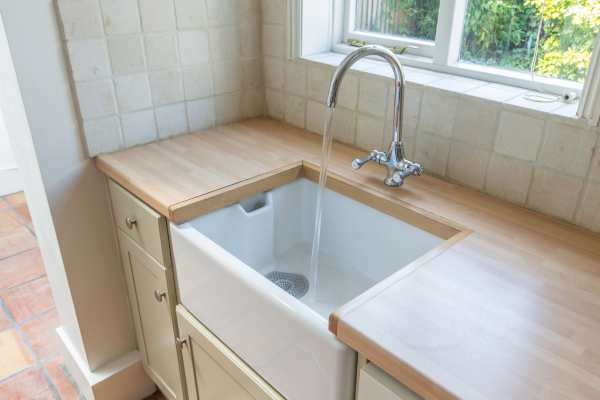
- Mild Soap and Water: Clean with a soft sponge and mild dish soap.
- Avoid Acidic Substances: Steer clear of using vinegar, lemon juice, or other acidic substances, as they can damage the copper.
- Dry Thoroughly: After cleaning, always dry the sink completely to prevent water spots and tarnish.
Preventive Maintenance
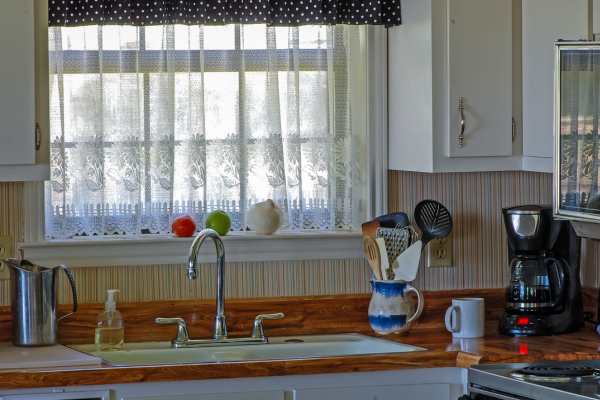
To keep your farmhouse sink looking pristine, incorporate these preventive measures into your routine:
- Avoid Leaving Standing Water: Standing water can cause mineral deposits and stains. Always wipe the sink dry after use.
- Use a Sink Mat or Grid: Protect the bottom of your sink from scratches and dents by using a sink mat or grid.
- Avoid Harsh Chemicals: Bleach, ammonia, and other harsh chemicals can damage the finish of your sink. Stick to mild, natural cleaners.
Regular Polishing
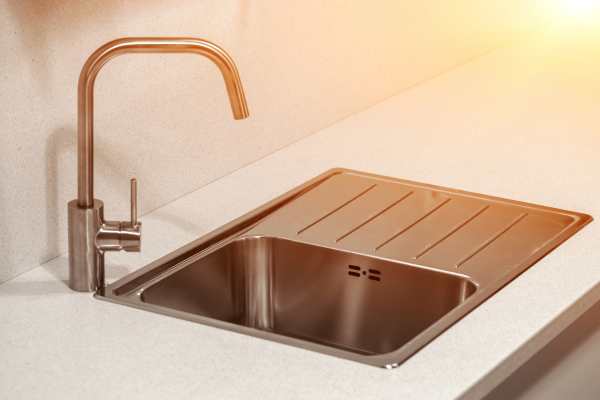
For stainless steel and copper sinks, regular polishing can help maintain their shine and prevent tarnish.
- Stainless Steel: After cleaning, apply a small amount of olive oil or mineral oil to a cloth and buff the sink.
- Copper: Use a copper polish or a mixture of lemon juice and baking soda to polish the sink, followed by thorough rinsing and drying.
Conclusion
Maintaining the beauty and functionality of your farmhouse stone sink clean is straightforward with regular care and the right cleaning techniques. By following these steps, you can ensure your sink remains a stunning focal point in your kitchen. Regular daily maintenance, combined with occasional deep cleaning, will keep your farmhouse sink free from stains and buildup, preserving its charm for years to come. Whether your sink is made of porcelain, stainless steel, or copper, these tips will help you keep it looking pristine and performing at its best.
